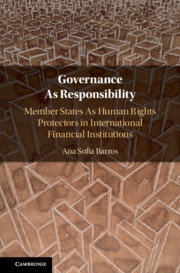 Governance As Responsibility
Governance As Responsibility Book contents
- Governance As Responsibility
- Governance As Responsibility
- Copyright page
- Dedication
- Contents
- Foreword
- Preface
- Acknowledgements
- Abbreviations
- Introduction
- I The Relationship between International (Financial) Institutions and Their Member States
- II Accounting for the Governance Role of Member States of International Financial Institutions in the Regime of International Responsibility
- III Member States As Human Rights Protectors in International Financial Institutions: Matching Governance with Responsibility
- Conclusion
- Bibliography
- Index
III - Member States As Human Rights Protectors in International Financial Institutions: Matching Governance with Responsibility
Published online by Cambridge University Press: 28 June 2019
- Governance As Responsibility
- Governance As Responsibility
- Copyright page
- Dedication
- Contents
- Foreword
- Preface
- Acknowledgements
- Abbreviations
- Introduction
- I The Relationship between International (Financial) Institutions and Their Member States
- II Accounting for the Governance Role of Member States of International Financial Institutions in the Regime of International Responsibility
- III Member States As Human Rights Protectors in International Financial Institutions: Matching Governance with Responsibility
- Conclusion
- Bibliography
- Index
Summary
Chapter III explores the terms in which international human rights law governs the conduct of Executive Directors as member State representatives in international financial institutions and how their responsibility may ultimately be engaged in case of human rights violations. Inspired by rule of law requirements of legality, and the constitutional values of representation and responsiveness, the first part of the chapter examines how these elements have been incorporated in the human rights regime. The notion that member States have a due diligence duty to ensure that human rights are respected and protected throughout institutional operations is analysed in two particular instances, notably, in their role as participants in institutional decision-making, as well as creators of the organisation’s structure and operational framework. The final part of the Chapter examines how member States’ failure to act diligently brings about their international responsibility. It thus analyses the various elements that define the determination of wrongfulness, as well as the provision of remedies to victims. In so doing, it addresses questions such as that of standing, of causality, and the division of reparation duties among multiple member States and the international financial institution.
Keywords
- Type
- Chapter
- Information
- Governance As ResponsibilityMember States As Human Rights Protectors in International Financial Institutions, pp. 133 - 210Publisher: Cambridge University PressPrint publication year: 2019
